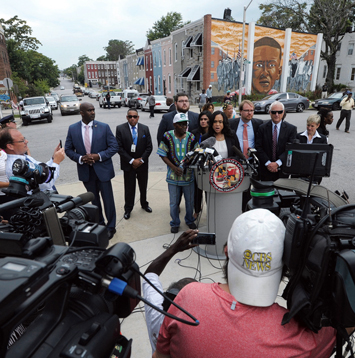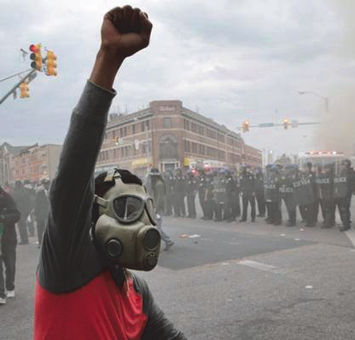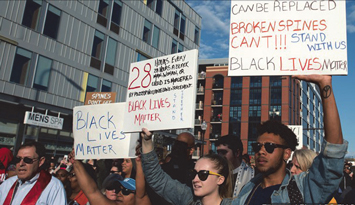An Unapologetic Prosecutor Drops Charges But Not The Fight Against Police Misconduct
By Barrington M. Salmon -Contributing Writer- | Last updated: Aug 5, 2016 - 12:36:14 PMWhat's your opinion on this article?
BALTIMORE—City State Attorney Marilyn Mosby was strident as she announced her decision to dismiss the charges against three police officers implicated in the death of 25-yearold Freddie Gray.
At a press conference, a defiant Mosby excoriated police officials and the criminal justice system, saying that if the case had been tried 100 times, the result would have been the same.
Ms. Mosby’s reaction came after Circuit Court Judge Barry G. Williams, on the afternoon of July 18, acquitted Lt. Brian Rice of all the charges against him. Judge Williams found him not guilty of reckless endangerment, involuntary manslaughter and misconduct in office. Earlier in the trial, Judge Williams dismissed a second-degree assault charge and prosecutors shelved a second misconduct charge at commencement of the trial.
Like two of his predecessors, Lt. Rice, opted for a bench trial instead of having his case heard by a jury and became the third officer to be acquitted by the judge. Justice Williams consistently hammered the prosecution for not presenting convincing evidence.

Baltimore State’s Attorney Marilyn Mosby, at podium, holds a news conference near the site where Freddie Gray, depicted in mural in background, was arrested after her office dropped the remaining charges against three Baltimore police officers awaiting trial in Gray’s death, in Baltimore, July 27. The decision by prosecutors comes after a judge had already acquitted three of the six officers charged in the case. At left is Gray’s father, Richard Shipley. Photo: AP Wide World Photos
|
“We were more interested in justice over convictions. I refused to allow the grandstanding of some, and the hyperbole of others to diminish our resolve from seeking justice for this young man. I was elected prosecutor; I signed up for this. I can take it. No matter how difficult and problematic this has been for my office, this pales in comparison to what mothers and fathers all across this country go through on a daily basis, including Freddie Gray’s parents. His decision to run from police proved to be fatal. Our office has never moved from seeking justice for Freddie Gray. We’ve devoted countless hours, countless sacrifices on your behalf.”
The disappointment in the decision inside and outside of Baltimore was palpable. The American Civil Liberties Union of Maryland described the outcome as a travesty, and representatives of traditional civil rights organizations similarly criticized the disposition of the case which has roiled Black residents of Charm City.
“We are deeply disappointed that no one has been held responsible for the in-custody death of Freddie Gray,” said Sherrilyn Ifill, president and director-counsel of the NAACP Legal Defense and Educational Fund, Inc. in a statement. “One thing is undisputed: When police placed Mr. Gray into the van he was conscious. When they removed Mr. Gray, he was unconscious and his spine was broken.”
“Without question, our hearts go out to the family of Freddie Gray and to all innocent victims of police violence. We continue to believe in the rule of law, but recognize that there are deep and structural flaws which must be corrected.”
Days after Ms. Mosby’s decision, Baltimore residents were still trying to digest the news and they bemoaned the sobering but bitter reality that Freddie Gray will likely never receive justice.
“I wasn’t surprised. Everything about this whole case was sketchy from the beginning. There were a whole lot of parameters in the case that pointed to this outcome once there was the first acquittal,” said lifelong resident Carey D. Olivis, Sr. “There were only three or four people who should have been charged: the initial arresting officer, the van driver, the shift supervisor and the shift commander. I believe they were at least culpable.”
Mr. Olivis said he believes victim Gray was injured during the arrest when officers subdued and handcuffed him with knees to his neck and upper back. Mr. Olivis and several Baltimore residents offered the unsolicited sentiment that the decision by the Gray family to accept a $6.4 million settlement practically ensured that there would be no police officer held accountable.
“The payoff came before the trial and negated any chance of getting a fair trial,” Mr. Olivis said. “If there wasn’t a payoff at the beginning, they’d be a different outcome. With $6.4 million, the family can’t pursue justice civilly. That has taken the blame out of each individual’s hands. How can you sue? There’s no recourse, no justice. If the coroner’s office declared this young man’s death a homicide, then who killed Freddie Gray?”

The death of Freddie Gray sparked days of civil unrest and clashes with police in Baltimore. Photo: Facebook.com
|
Along Pennsylvania Avenue, looters burned stores and businesses, torched vehicles and shattered glass. Some were venting their anger, others used the opportunity to steal and pillage.
On a recent Saturday, small groups of people on Pennsylvania Avenue and some side streets not far from the epicenter of the civil unrest stood around chatting.
Others sat on stoops or makeshift seats passing the time. Young men a business owner called drug dealers crowded on one corner of the street selling their wares openly.
“Please, the cops sit in their cars and watch the guys selling drugs,” one woman said with disgust. “The runners live in ‘abandominiums,’ (abandoned or boarded up buildings) where some of them have hooked up the electricity and others use candles.” Edith Johnson, owner of Medina’s, which sells Cds and DVDs, said the community is slowly coming back to life.
“They’re starting to fix up the neighborhood. They’re painting murals on the shutters of businesses, rebuilding,” said Ms. Johnson, who has been in business for seven years. “But the lack of jobs is the biggest issue.”
Nation of Islam Student Minister Carlos Muhammad said Baltimore remained quiet after the Mosby announcement, adding that he didn’t expect there to be any unrest.
“There was a mass of people who are tired. There’s a certain level of numbness. The conscious community says enough is enough. There must be economic development and empowerment and we must address it ourselves. We should not expect anything to come from anyone else,” he said.
But Min. Muhammad said Baltimore is divided along political lines with most Black residents either showing no interest or not knowing what’s really going on.
“There’s no consensus of where to go,” he explained. “On April 27, the Nation of Islam took to the streets and gained control of Pennsylvania and North Avenue. Work has been going on in Gilmore Homes. We’ve been establishing a beachhead to make positive change. We have no desire to toot our horns. We need to unite because we all have a part of the puzzle.”
Min. Muhammad said little will change until the police are held accountable.

Protesters in Baltimore after the death of Freddie Gray. Photo: MGN Online
|
“The legal community has been asking how she could do this. After watching the first few cases, I’m not surprised. I was definitely expecting it to end this way because of (history).”
Ms. Mosby has been under intense fire from pro-police critics ranging from the Fraternal Order of Police, to former Baltimore City Police Commissioner Anthony Batts, Maryland lawmakers and some residents. They say Ms. Mosby made the decision to charge the officers to calm unrest and blasted her for bowing to popular sentiment.
Mr. Batts was fired in 2015 by Mayor Stephanie Rawlings-Blake after a spike in crime in the city and in the face of steady criticism of his handling of the civil unrest by the police union.
“She’s immature, she’s incompetent, she’s vindictive and that’s not how the justice system is supposed to work,” Mr. Batts told the Baltimore Sun. “The justice system is supposed to be without bias for police officers, for African Americans, for everyone.”
Mr. Batts contends that Ms. Mosby should never have filed the charges, adding that her decision to drop the charges against the remaining three officers was long overdue.
Ms. Mosby hasn’t backed down and in her press conference castigated the criminal justice system and a police department with the tendency to protect its own.
“The successful prosecution of on-duty police officers in this country is unsurprisingly rare, and blatantly wrought with systemic and apparent complications,” said Ms. Mosby. “What we realized early on, is that police investigating police, whether friends or merely colleagues, was problematic. There was a reluctance and obvious bias by some in the police department that became apparent at every step of this investigation.”
She cited challenges, including not having access to an independent investigative system, not having a say in whether the trial would proceed with a judge or before a jury; the lack of community oversight in this process; and few real and substantive reforms of the criminal justice system.
“We all bore witness to inherent bias of when police police themselves. I’m grateful to show the world the reality of the justice system every step of the way,” she said.
“Every battle, hurdle, obstacle that we’ve overcome since we began the pursuit of justice is a needed step. This system is in need of reform when it comes to police accountability. As long as I’m chief prosecutor for this city, I vow to you that my office and I will fight, fight for a fair and equitable criminal justice system.”
The goal of a fair and equitable criminal justice system is one that civil rights and legal advocacy groups like the NAACP Legal Defense Fund and American Civil Liberties Union work hard to bring into being.
Monique Dixon of the NAACP Legal Defense Fund echoed similar sentiments. She said the United States faces a crisis around the way law enforcement is dealing with Black and Brown communities.
“In Baltimore, there are several opportunities for elected officials and residents to come together to build confidence in the police,” said Ms. Dixon, deputy director of policy and senior counsel, in a recent interview. “There are new contract negotiations. LDF has asked them to allow civilians to serve on the disciplinary review board to look at how officers are disciplined. We have not sat down with (Fraternal Order of Police President) Gene Ryan. We’re hopeful we’ll find a middle ground. Building trust is the key to change.”
Ms. Dixon said the Justice Department is in the process of wrapping up a pattern or practice investigation of the police department.
“We anticipate that the report will show racial profiling and the use of extensive force. I fully expect an agreement going forward,” said Ms. Dixon, a Baltimore resident. “We recommend that as they negotiate the agreement that residents have a seat at the table, including selection of monitors who will oversee any agreement.” Ms. Dixon said she hopes the feds and city officials will enter into a consent decree where a judge and monitor would oversee the terms of that agreement.
Wake Forest Law Prof. Kami Chavis said very often, many cases like this will not rise to the level of criminal responsibility.
“This case is an example of the extreme difficulty of prosecuting officers,” said Prof. Chavis, a senior fellow at the Joint Center for Political and Economic Studies. “This means that the city could be forced to change but it’s very difficult to hold those individual officers responsible. I think, hope there will be some systemic change because this was such a high profile case. There are probably 10 more of these cases we didn’t hear about.”
Activists say those seeking changes to a flawed criminal justice system must go to the polls and vote for prosecutors and other elected officials; Congress needs to pass federal legislation to outlaw racial profiling; and police departments must be mandated to collect information on police-involved deaths and lethal force that would be added to a national database.
Baltimore Pastor Jamal Bryant said it is imperative for elected officials, community leaders and everyone concerned about the police-involved killings of Black people to continue the national discourse as they coalesce around finding solutions. He suggested activists and advocates embrace the model of the Black Panthers of policing the police; implement the Nation of Islam model of securing communities; and pattern the actions of both the Deacons of Defense and the Rev. Martin Luther King, Jr.
“Revamping the criminal justice institution is not an inner-city issue, is not a Southern issue because of what happened in Minnesota and it’s not a big city issue. It’s a national issue,” said Rev. Bryant, senior pastor of Empowerment Temple AME Church in Baltimore. “We need a complete scrub-down of the entire judicial system.”
INSIDE STORIES AND REVIEWS
-
-
About Harriett ... and the Negro Hollywood Road Show
By Rabiah Muhammad, Guest Columnist » Full Story -
Skepticism greets Jay-Z, NFL talk of inspiring change
By Bryan 18X Crawford and Richard B. Muhammad The Final Call Newspaper @TheFinalCall » Full Story -
The painful problem of Black girls and suicide
By Charlene Muhammad -National Correspondent- » Full Story -
Exploitation of Innocence - Report: Perceptions, policies hurting Black girls
By Charlene Muhammad -National Correspondent- » Full Story -
Big Ballin: Big ideas fuel a father’s Big Baller Brand and brash business sense
By Bryan Crawford -Contributing Writer- » Full Story






 Click Here Stay Connected!
Click Here Stay Connected!








